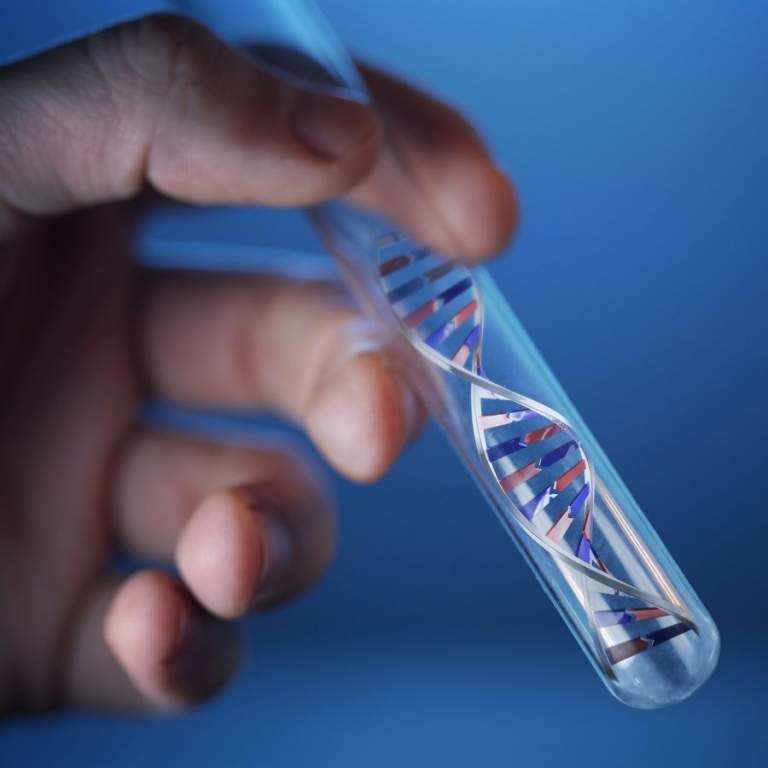Lactose intolerance genetic test
Lactose intolerance genetic testing by oral mucosal sampling can be used to detect the presence or expected occurrence of genetically determined lactose intolerance.
What is lactose intolerance?
Lactose intolerance, also known as lactose sensitivity, is a condition when the body is unable to digest lactose taken in with food in the absence of the enzyme (lactase) that breaks down lactose.
Lactose is a complex sugar that requires the enzyme lactase produced in the small intestine to break down the lactose molecule into simple sugars that the body can utilize.
Lactose intolerance is not really a disease, but an evolutionary state, as adult mammals no longer need to digest lactose. As a result, in humans, the production of the enzyme that breaks down lactose decreases significantly with age after the breastfeeding period, it is a result of a gene variant that it persists in some people.
A larger part of the Hungarian population is able to digest lactose, among the Hungarian population approx. 60-65% are lactose tolerant and 35-40% are lactose sensitive.
It is important to highlight that lactose sensitivity is not the same as food intolerance caused by lactalbumin. A separate laboratory package is available to investigate complaints after consuming milk, which also includes testing for lactalbumin allergy and food intolerance. However, complaints always require a gastroenterological examination, avoiding self-diagnosis, because the symptoms can be caused by several diseases.
What are the symptoms of lactose intolerance?
Lactose sensitivity is associated with unpleasant gastrointestinal symptoms that occur 2 to 4 hours after consuming a food containing lactose. Lactose, which continues undigested in the intestines, attracts water, which can lead to dilute stools and explosive diarrhoea due to strong gas formation.
In such case, lactose is broken down by colon bacteria instead of enzymes in the small intestine. The resulting gases and acidic decomposition products may cause bloating, abdominal cramps, intestinal cramps, stomach rumbling, nausea, headache, and a burning sensation when defecating.
Symptoms resolve within 1-2 days without consuming additional lactose-containing food.
What types are known?
We distinguish between two types of lactose intolerance: hereditary and acquired.

Congenital lactase deficiency is extremely rare, in which case the newborn inherits a defective lactase gene from both parents and is unable to digest breast milk in the absence of the lactase enzyme.
Adult lactose intolerance is much more common when the level of lactase in the body gradually decreases with age. The rate of decrease varies from individual to individual, starting after 2 years of age, but not causing symptoms before 6 years of age.
The genetic test is suitable for identifying hereditary adult lactose intolerance.
In case of secondary lactose sensitivity, the production of lactase is influenced by other factors: celiac disease (gluten sensitivity), Chron’s disease, bacterial infection, parasites, chemotherapy. This type is reversible, and by eliminating the cause, the ability to break down lactose is restored.
How to diagnose lactose intolerance?
Since similar gastrointestinal complaints can be caused by different diseases, it is important that the diagnosis of lactose intolerance be made by a gastroenterologist with knowledge of the symptoms and medical history.
Lactose sensitivity is most often diagnosed by an exhalation test, in which the hydrogen content of the air exhaled by the patient is examined at certain intervals after consuming a lactose-containing beverage. In the case of lactose sensitivity, after consuming lactose, the hydrogen content of the exhaled air increases significantly, as the lactose, which is broken down in the intestine, produces hydrogen gas, part of which is absorbed into the bloodstream and exhaled through the lungs. The biggest disadvantage of the test is the lactose consumed during the test, which is associated with the occurrence of gastrointestinal symptoms in people who are lactose sensitive.
A genetic test offers an alternative to a more gentle test of lactose sensitivity.

Why is a genetic test more advantageous?
Genetic testing has several advantages over the exhalation test:
no lactose intake is required for diagnosis, so there are no unpleasant symptoms associated with the test
sampling can also be done from the oral mucosa, therefore it can also be used in case of young children
gives a reliable result
the result is not affected by any medication
having an empty stomach is not required before the test
What does the lactose intolerance genetic test show?
The genetic test for lactose intolerance shows hereditary lactose intolerance. In this type, the function of the lactase enzyme is still ensured in infancy and then gradually decreases.
It is based on the inhibitory regulation of intestinal epithelial lactase activity, for which C_13.9kbT (13910 C/T) and and G_22.18kb polymorphisms (22018G/A) are responsible. The C/C and G/G alleles are responsible for inhibiting lactase activity, and the T/T and A/A alleles are responsible for maintaining lactase activity.
The test determines what alleles the individual has at the polymorphic site. Those with T/T or A/A C/T or A/G alleles at the polymorphic site will continue to produce lactase enzyme in adulthood, thus being able to digest lactose. Those with C/C and G/G alleles, due to its inhibitory function, will become sensitive to lactose over time as lactase enzyme levels continue to decline in their bodies. In our test, we examine the genetic modification of both alleles.
How is sampling performed?
The test is performed using an EDTA tube, all genetic tests can be performed using a single tube, oral mucosa swabs are recommended for children.
The test can be performed simultaneously with other tests.
How do I prepare for the test?
No food or drink should be consumed 2-4 hours before oral mucosal sampling, and chewing and smoking should be avoided as well.
Having an empty stomach is not required prior to the blood count.

What to do if the genetic result shows lactose intolerance?
It is important to consult a gastroenterologist in each case with the results of the test, who will determine in the light of the results and symptoms whether lactose intolerance is actually causing the complaints and what treatment is needed.
If the test indicates genetically determined lactose intolerance and is associated with symptoms, your doctor and/or dietitian will recommend a personalized diet that provides all the necessary nutrients, even with lactose restrictions. It is not always necessary to completely withdraw lactose, as the body tolerates a certain amount, so low-lactose products do not cause complaints in this case either. With medical advice, it is also possible to use a lactase replacement enzyme orally, which should be taken at the same time as consuming lactose-containing food, thus avoiding the occurrence of unpleasant symptoms.
In case of children, if the test shows genetically determined lactose intolerance but there are no symptoms yet, a specific lactose-free diet is not recommended. The rate of lactase enzyme depletion may vary from individual to individual, and a child can consume milk-containing foods containing important nutrients without any problems, even as a teenager.
When is the result expected?
On the 12th working day having handed in the sample.

